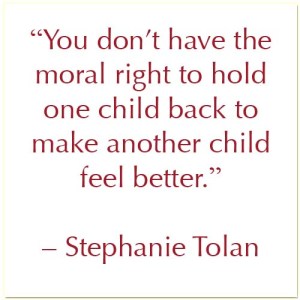You learn that your child is gifted; maybe he or she even mastered up to 50% of the year’s curriculum before school begins (Ross, 1993) (Brulles, et al., 2010). So school should be easy, which means good grades, right? Not necessarily.
One of the greatest frustrations for parents is the assumption that giftedness means performing well in traditional school environments. Gifted children are not intrinsically motivated by good grades; they are more passionate about the acquisition of knowledge than performing rote tasks. This causes a problem when the school structure and grades rely on repetition and memorization.
With budget cuts, growing class sizes, and an emphasis on standardized test scores, it is difficult for educators to differentiate instruction and meet the needs of every student in the classroom. Often, it is the gifted students who are short-changed because they already know much of the material they need to demonstrate on high stakes tests.
Bored, unchallenged students are often a result. Many check out of the learning process, which can lead to underachievement and even academic failure.
Although there are many reasons gifted kids underachieve, the most common are
- A mismatch between students and their classroom environment
- Disinterest in content
- Poor self-concept and fear of failure
- Learning disabilities
- Lack of self-regulation and study skills
It is important for underachievement to be spotted early, when possible, and addressed quickly. If your children think that learning and school require little to no effort, they may continue to slack off and may not ever learn to challenge themselves and work to their full potential in higher level thinking (Winner, 1996). If this is a problem your children encounter, it is important that you work with their school and challenge them whenever possible.
Start this process by finding out more. Why exactly is your child bored? A teacher will not be able to make the necessary accommodations without this knowledge. Is it because the class is struggling to understand division, to which several days of class have been devoted, but your child has perfectly understood division for six months and has nothing to do while the teacher continues to explain it? Approach the teacher with this specific challenge and ask for an accommodation to solve the problem.
 When speaking with your child’s teacher, you may have to combat misunderstandings about giftedness and underachievement in gifted children. Be prepared. Bring support to show your child’s gifts (test scores, GATE qualification, assessments, etc.). Many parents also find it helpful to bring research and journal articles to meetings like this to support your concerns and give the teacher the opportunity to learn more. You can also provide the teacher with several potential solutions, including some form of acceleration.
When speaking with your child’s teacher, you may have to combat misunderstandings about giftedness and underachievement in gifted children. Be prepared. Bring support to show your child’s gifts (test scores, GATE qualification, assessments, etc.). Many parents also find it helpful to bring research and journal articles to meetings like this to support your concerns and give the teacher the opportunity to learn more. You can also provide the teacher with several potential solutions, including some form of acceleration.
Remember that a good relationship with your child’s teacher or a school administrator is crucial to receiving special accommodations, so do your best to show how this can be a mutually beneficial relationship. Approach the teacher in a positive manner. Acknowledge that the teacher is the expert in education, and you trust his or her expertise there. However, you are the expert on your child, and you can offer the teacher some suggestions on what will be positive or negative situations for your child. Once you’ve discussed the problems, you can try to reach agreements with the teacher on how to mitigate these challenges. Also explain to the teacher that you are available to discuss your child at any time. The better your communication is with the school, the more your child will benefit.
Outside of school, give your child an environment that encourages inquiry and critical thinking. Provide access to supplemental programs geared towards your child’s intellectual ability and pace of learning. The more opportunities you provide for your child to be challenged outside of school, the more you will emphasize that hard work does pay off, even if that isn’t being demonstrated in school. You should also help your child develop communication skills so that he or she can effectively communicate with you and teachers if school is not challenging or engaging enough.
Understanding, spotting, and addressing factors that lead to underachievement early can help your children learn to challenge themselves and work towards their full potential.
 This post is a part of SENG’s National Parenting Gifted Children Week Blog Tour. We encourage you to browse the list of participating blogs to find more posts about parenting gifted children.
This post is a part of SENG’s National Parenting Gifted Children Week Blog Tour. We encourage you to browse the list of participating blogs to find more posts about parenting gifted children.
What has your experience been in addressing your child’s underachievement or unchallenging work at school? Please share your experiences with us in the comment section below!
Would you like more articles about giftedness like this sent directly to your inbox? Sign up for our email newsletter!
Like this post? Please share!



